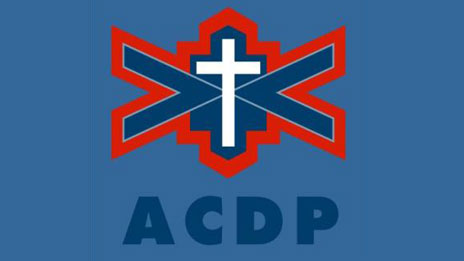The African Christian Democratic Party (ACDP) was formed in December 1993 with the aim of representing South African Christians in Parliament. It won two National Assembly seats in 1994 and six in 1999.
The ACDP was the only party in the National Assembly that voted against the adoption of the Constitution in 1994, citing moral and Biblical objections to some of the document’s clauses – particularly the rights of gays and lesbians.
According to its manifesto, the ACDP stands for “Christian principles, freedom of religion, a free market economy, family values, community empowerment and human rights in a federal system”.
The greatest growth that the ACDP has ever experienced was during the 2000 Local Government Elections. With an increase from 7 councillors to more than 70 nationally, the ACDP proved once again that it is here to stay.
The party’s best general elections performance was in 1999 when it garnered 6 seats in the National Assembly, an addition of 4 from 2 in 1994. The party went on to maintain the 6 seats in 2004, however, losing one they had gain in the 2003 floor crossing.
But things took a negative turn. After the 2005 and 2007 floor crossing the party found itself with only 4 seats. It went on to lose a further seat in the 2009 general elections and whether they can improve on that or continue with the trend of shedding more representation in the National Assembly remains to be seen.
Behind the logo
The Logo was designed by a number of ACDP pioneers, and was aimed at representing what a Party with Biblical Christian principles should entail.
The two arrows from left and right, signify drawing South Africans from the right and left of race, politics, ideology, Church affiliation, religion, language, tribe and culture towards the Cross of Jesus Christ in reconciliation, and unity, in God Almighty, and with one another.
The arrows upward and downwards illustrate the direction up towards God and down towards our fellow South Africans and our communities.
The red border signifies the Blood of Jesus Christ, surrounding and protecting the ACDP and its members and followers, and the people of South Africa, as the party submits to the Saviour and Lord of all creation and of South Africa.
The Logo was designed by a number of ACDP pioneers, and was aimed at representing what a Party with Biblical Christian principles should entail.
2014 Elections Manifesto
On jobs the ACDP says: To boost employment, reduce poverty and achieve annual economic growth of 7%.
The ACDP will:
• Ensure that the state provides the enabling environment for business to grow the economy faster and create more jobs by providing the necessary infrastructure, a professional public service and good education and vocational training to ensure the necessary skills base needed for a growing economy;
• Raise global competitiveness and foreign earnings by focusing on South Africa’s comparative advantages, such as mining, construction, manufacturing, agriculture, tertiary education, tourism and business services;
• Increase public sector investment in infrastructure to provide sufficient power generation, ports, roads, public transportation and dams and reservoirs;
• Review the Gauteng e-tolling system and consider alternative funding models, such as the fuel levy, to finance road construction and maintenance;
• Encourage domestic and foreign investment through policy certainty and building confidence in the county’s growth potential;
• Ensure that fiscal policy is sustainable by reviewing government expenditure programmes and eliminating wasteful, irregular and corrupt expenditure;
• Shift the focus of government expenditure from consumption to capital investment;
• Support small businesses by facilitating access to financial assistance and mentorship programmes and review the cumbersome regulatory environment;
• Review labour legislation and collective bargaining to remove obstructions to growth and address tense labour relations (that often result in violent strikes), within the framework of fair labour practices;
• Encourage productivity and a culture of savings, investment, the patient building of capital and hard work;
• Ensure that economic empowerment results in broader socio-economic upliftment, such as workers’ share schemes, rather than the current pervading culture of enrichment that mainly benefits a small group of politically-connected persons;
• Lower the barrier to entry for young job seekers by extending the youth wage subsidy;
• Encourage training and development within industries through grants and tax incentives for apprenticeships and labour-intensive practices;
• Increase trade with countries with fast-growing markets such as Asia, Brazil and Africa;
• Promote stricter standards of international financial governance to reduce the risk of another global financial meltdown; and
• Ensure that the World Bank and International Monetary Fund are more democratic and transparent.– edited by Sipho Kekana
– By Southafrica.info


